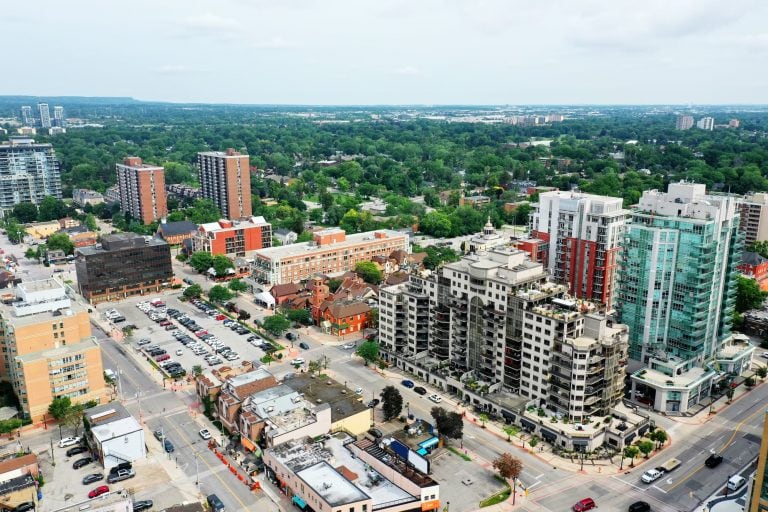Toronto condos and Toronto apartments are two different types of properties that each offer their own unique benefits. Both apartments and condos in Toronto are on the rise due to modern developments and city growth. With an influx of these property types in Toronto, it’s best that you know the difference between apartments and condos so that you can choose what fits your needs. This article will take a look at condos vs apartments in Toronto to help you compare the two and decide which is best for your next move!
Condos vs Apartments: what’s the difference?
While condos and apartments appear to be pretty similar, there are many differences. In fact, the fact they are “units” in a building may be their ownly similarity.
1. Ownership
The first, and most important, difference between condos and apartments lies within ownership. Condos are often owned by those who reside in them, while apartments are owned by the company or person that rents them out.
Typically, apartments are owned by a corporation while condos are owned individually. This means that you can choose to purchase a condo and reside in it, making you both the owner and resident of that condo. However, condos can also be rented out, which helps provide income for the owner and makes them attractive properties for investors. In contrast, an apartment is rented out to residents by the leasing company that owns and oversees the apartment complex.
In the simplest terms: you can own, reside in, and/or rent condos, but you can only rent apartments.
2. Budget
Speaking of ownership, in order to own a condo, you most likely need to get a loan. Along with the down payment for the loan, will come a monthly payment which may or may not include addidtional fees to help upkeep the building. Often the combination of these fees makes owning a condo more expensive than owning an apartment in the short term. However, in exchange for being more expensive then renting, owners of condos in Toronto are able to build up equity at an incredible rate.
An apartment on the other hand may require a security deposit and then it’s just the monthly rent. Nothing else to really consider outside of utilities (which you’d have to consider in a condo as well).
3. Property Management
When it comes to property management, condos and apartments are very different. In fact, this aspect can be the determining factor in whether someone decides to choose a condo or apartment.
Since apartments are owned by an entire corporation, there are typically well-thought-out management practices put in place for residents. With an apartment, you’ll have someone to contact if something breaks or needs updating. This usually doesn’t cost the residents anything since it is the leasing company’s responsibility to uphold the standards of their apartments.
Condos, on the other hand, are owned by an individual more often than not. If you are residing in your own condo, you are the property manager as you own the space. If you are renting the condo from another person, they are considered your landlord and property manager. In this case, any fixes or updates needed in the condo are their responsibility.
Pro Tip: Whether you are looking at an apartment or a condo, make sure to thoroughly read your leasing contact so that you understand the expectations of yourself and your landlord when it comes to property management.
Which property management style more convenient?
In most cases, the corporations that oversee apartment rentals are more reliable. They are running a business and own a company that has legal responsibilities and structures, so it’s easier to ensure that the property management experience is good.
With condos, it entirely depends on the person who owns the property. This person may be overbearing and insist that they come to check on the condo regularly, or they could manage from afar and only reach out when necessary. Your condo manager could also choose to not make fixes, or they could be difficult to reach. However, condo owners typically take pride in their property and will take care of things that need to be updated.
4. Amenities
Both apartments and condos provide their fair share of services, but condos generally offer more. Historically, condos in Toronto have come with amenities such as pools, cafés, convenience shops, spa rooms, etc. However, Toronto has seen a huge influx of these modern housing types and are now honing in on making them even more desirable. Many Toronto condos now feature amenities such as:
- Nail salons
- Theatre rooms
- Party rooms
- Libraries
- Gyms
- Restaurants
On the other hand, apartments generally come with necessities rather than luxuries. Apartments may have a communal laundry room (or in-room laundry), a public workspace, and a community area, but you’ll have fewer amenities than you’d have in a condo. However, this does typically make apartments the cheaper option of the two.
5. Availability in Toronto
There are many apartments and condos available throughout Toronto, with more being constructed each year. Let’s look at the availability of condos vs apartments in Toronto:
Condos
Condos are plentiful throughout Toronto, especially in neighbourhoods closer to the downtown centre. In the last quarter of 2021, there were 7,810 condos listed in Toronto. Most Toronto condos are located in the Downtown Toronto, Yorkville, and Liberty Village neighbourhoods.
Apartments
While fewer than condos, there are still plenty of apartments to choose from in Toronto. Most of these buildings are older than condos are, and several of them have been revitalized over the past decade. There are around 5,093 apartment listings throughout the Toronto area, many of them located Downtown, in the Yonge-University neighbourhood, and the Cabbagetown neighbourhood.
Toronto Condos vs Apartments
In Toronto, condos and apartments can be very similar. In terms of price, renting a condo tends to be a little more expensive than renting an apartment, though you do have access to more amenities. If you’re looking for a place closer to downtown, condos would likely be your best bet as they are typically in the more populated areas. If you don’t care about the luxury amenities and really just need a place to call home, apartments may be a better (and cheaper) option for you.
In the end, condos and apartments both have their own pros and cons, and which one is best for you truly depends on your own individual needs. However, Toronto real estate has plenty of options for both condos and apartments, so you should have no problem finding a new place to call home.













